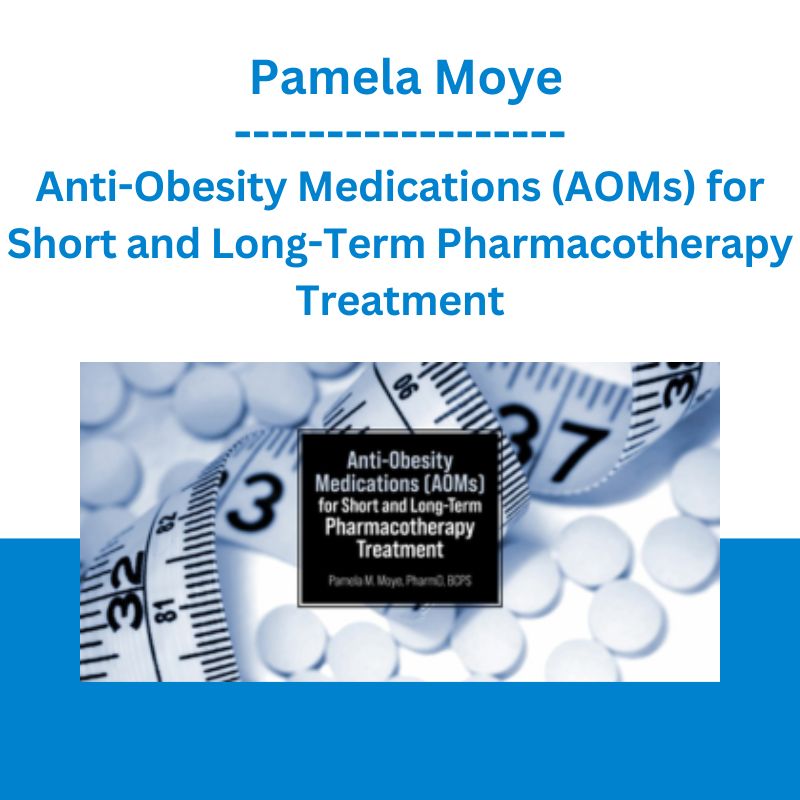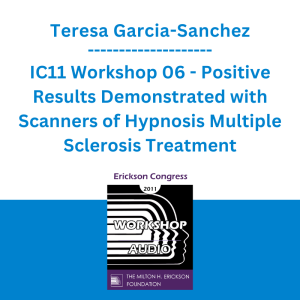*** Proof of Product ***
Exploring the Essential Features of “Anti-Obesity Medications (AOMs) for Short and Long-Term Pharmacotherapy Treatment – Pamela Moye”
Obesity is a complex and multifaceted condition that affects individuals across all age groups, races, and socioeconomic backgrounds, with far-reaching consequences for their health and well-being. It is a prevalent global health issue affecting approximately half the world’s population. A shared mission among healthcare professionals is to equip themselves with the knowledge and skills to address this critical issue effectively. The pharmacotherapy management of obesity is not just about prescribing medications; it is about transforming lives, improving patient outcomes, and helping individuals regain control over their health and quality of life. Currently, the Federal Drug Administration (FDA) has approved nine anti-obesity medications (AOMs) for the short and long-term treatment of obesity. AOMs are recommended with lifestyle change for the therapy of overweight and obesity, following a similar methodology to other chronic disorders.
Pamela Moye, PharmD, BCPS, will breakdown the various facets of obesity management, from understanding the root causes and the epidemiological context to exploring the latest pharmacological interventions. This engaging session will also provide you with insights into practical approaches to develop patient-centered treatment plans, empower patients with the knowledge they need to make informed decisions about their health and promote long-term adherence. There will be an exploration of case studies that challenge decision-making skills and enrich clinical expertise.
Speaker
Pamela Moye, PharmD, BCPS, is a seasoned and dedicated professional with experience in pharmacy education and patient care. As a board-certified pharmacotherapy specialist, she has been at the forefront of imparting knowledge and skills to diverse learners, including pharmacy and medical students, residents, and licensed healthcare professionals. Dr. Moye’s expertise lies in guiding her students and fellow professionals in evidence-based pharmacotherapy tailored to individual patients’ needs, clinical presentations, laboratory data, and co-existing medical conditions.
Dr. Moye has excelled in her role as an educator and as a liaison between healthcare providers and patients. She has played a pivotal role in ensuring healthcare providers communicate effectively with their patients, helping them understand and adhere to the prescribed medications. Among her many areas of expertise, Dr. Moye has a particular interest in using medications to treat obesity. Her research and teaching in this field aim to shed light on evidence-based pharmacotherapy options for obese individuals, offering hope and solutions to improve their health and well-being.
Dr. Moye’s passion for education runs deep, and it is intricately intertwined with her dedication to making a positive impact on society. Her commitment to lifelong learning and continuous improvement drives her teaching, practice, and research. She believes the key to improving patients outcomes and advancing pharmacy practice lies in empowering others through education and fostering a culture of lifelong learning.
Speaker Disclosures:
Financial: Pamela Moye has an employment relationship with Mercer University College of Pharmacy. She receives a speaking honorarium from PESI, Inc. She has no relevant financial relationships with ineligible organizations.
Non-financial: Pamela Moye serves as the chair of the American Association of Colleges of Pharmacy. She is a member of the Nigerian Association of Pharmacists and Pharmaceutical Scientists in the Americas, the National Pharmaceutical Association, American Academy of HIV Medicine, and the American College of Clinical Pharmacy.
Objectives
- Review the underlying pathophysiology of obesity and metabolic adaptations to weight loss.
- Identify the pharmacotherapy options available for obesity management, including FDA-approved medications, their mechanisms of action, and their efficacy.
- Explain the indications, contraindications, and precautions associated with various obesity medications.
- Recognize potential side effects and adverse reactions of obesity medications and develop strategies for managing them.
- Implement monitoring and follow-up strategies to assess the effectiveness of pharmacotherapy and address non-responder and relapse issues.
- Apply the most recent evidence-based guidelines to develop individualized patient treatment plans, considering patient-specific factors and goals.
Outline
FDA Approved Obesity Pharmacotherapy Options
- Orlistat
- Phentermine
- Phentermine and topiramate extended release
- Byproprion and naltrexone extended release
- Liraglutide
- Semaglutide
- Setmelanotide
- Tirzepatide
Mechanism of action and efficacy
Indications, contraindications, and precautions
Potential side effects and adverse reactions
Medication safety and monitoring
Individualized Treatment Plans
- Tailoring pharmacotherapy to patient-specific factors
- Dosing strategies and titration
- Monitoring and follow-up
- Addressing non-responder and relapse issues
Case Study Reviews
- Review patient cases and scenarios
- Discussion of treatment decisions and outcomes
Please see the full list of alternative group-buy courses available here: https://lunacourse.com/shop/










 Teresa Robles - IC11 Workshop 68 - Working with PTSD with Ericksonian Techniques
Teresa Robles - IC11 Workshop 68 - Working with PTSD with Ericksonian Techniques  Matthew Kratter - Trader University
Matthew Kratter - Trader University  Team NFT Money - Ultimate NFT Playbook
Team NFT Money - Ultimate NFT Playbook  Jesse Livermore Trading System - Joe Marwood
Jesse Livermore Trading System - Joe Marwood  Dividend Policy: Theory and Practice - George Frankfurter, Bob Wood & James Wansley
Dividend Policy: Theory and Practice - George Frankfurter, Bob Wood & James Wansley  Teresa Garcia-Sanchez - IC11 Workshop 06 - Positive Results Demonstrated with Scanners of Hypnosis Multiple Sclerosis Treatment
Teresa Garcia-Sanchez - IC11 Workshop 06 - Positive Results Demonstrated with Scanners of Hypnosis Multiple Sclerosis Treatment  The Injured Shoulder: The Strategies, Testing & Criteria to Determine When to Return to Sports - George Davies - PESI
The Injured Shoulder: The Strategies, Testing & Criteria to Determine When to Return to Sports - George Davies - PESI  IC07 Topical Panel 05 - Anecdotes & Metaphors - Steve Andreas, Norma Barretta, Rubin Battino & George Burns
IC07 Topical Panel 05 - Anecdotes & Metaphors - Steve Andreas, Norma Barretta, Rubin Battino & George Burns  Julie Stoian & Cathy Olson - Launch Gorgeous - Funnel Gorgeous Bundle
Julie Stoian & Cathy Olson - Launch Gorgeous - Funnel Gorgeous Bundle  Teresa Garcia, Richard Landis, Kathryn Rossi & Lilian Borges - IC11 Topical Panel 10 - Meditation, Spirituality & Hypnosis
Teresa Garcia, Richard Landis, Kathryn Rossi & Lilian Borges - IC11 Topical Panel 10 - Meditation, Spirituality & Hypnosis  Fred Haug - Virtual Wholesaling Simplified
Fred Haug - Virtual Wholesaling Simplified  George Fontanills & Tom Gentile - Optionetics 6 DVD Series Home Study Course (Digital Download)
George Fontanills & Tom Gentile - Optionetics 6 DVD Series Home Study Course (Digital Download)  Akil Stokes & Jason Graystone - TierOneTrading - Trading Edge 2019
Akil Stokes & Jason Graystone - TierOneTrading - Trading Edge 2019  Teresa Robles - BT16 Short Course 14 - Therapy Based on Universal Wisdom for the Treatment of Chronic Pain
Teresa Robles - BT16 Short Course 14 - Therapy Based on Universal Wisdom for the Treatment of Chronic Pain  Trade Like Mike - The TLM Playbook 2022
Trade Like Mike - The TLM Playbook 2022